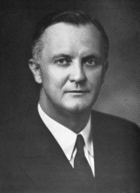Colgate Darden
He also won re-election and served alongside Daniel Coleman, Vivian L. Page and Wilson W. Vellines from 1930 to 1933, when Darden resigned because of his election to Congress.
Darden also supported loans to European allies as early as 1939, before the United States entered World War II.
[7] Darden was elected Governor of Virginia with 80.72% of the vote, defeating Republican Benjamin Muse, Communist Alice Burke, and Socialist M. Hilliard Bernstein.
He also eliminated the state debt (a core value of the Byrd organization) and created a surplus which was allocated to vocational schools, colleges, hospitals and other public services (including electrification of all Virginia educational institutions).
[8] Governor Darden also refused to overturn the firing of several black educators following the 1940 federal equal pay decision in Alston v School Board of Norfolk.
The latter concern had its origin in Darden's actions as Governor of Virginia, where he recommended barring students at the College of William and Mary from living in fraternity or sorority houses on the grounds that it was "undemocratic" and placed undue financial burden on parents.
[10] While Darden favored admitting African Americans to professional and graduate schools after the Supreme Court mandated such, he otherwise shared the "separate but equal" stance of many white Southerners of the pre-Brown v. Board of Education (1954) era.
"[11] In that year, following federal litigation, Gregory Swanson became the first black student admitted to the University of Virginia School of Law.
[12] Darden also testified as a witness favoring segregation in Davis v. County School Board of Prince Edward County, one of the companion cases to Brown, and Judge Albert Bryan, in the 3-judge decision upholding the unequal schools which the Supreme Court reversed, specifically cited Darden's testimony as influential.
[15] At Virginia, Darden was responsible for erection of the student union building, named Newcomb Hall for his predecessor John Lloyd Newcomb; the establishment of the Judiciary Committee (which handled student misconduct that did not rise to the level of an honor offense); the creation of the graduate school of business administration (named in his memory) and significant improvements to faculty salaries.
[16] President Dwight D. Eisenhower appointed Darden as a U.S. delegate to the United Nations General Assembly in 1955, as he broke with the Byrd Organization's Massive Resistance policy.



